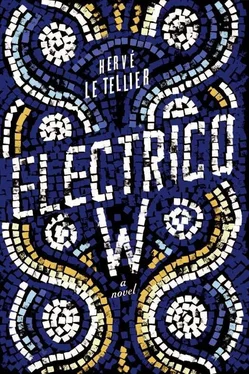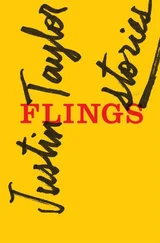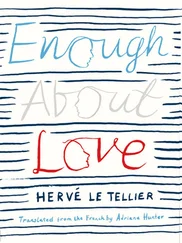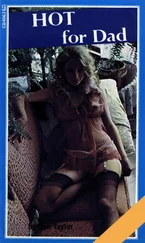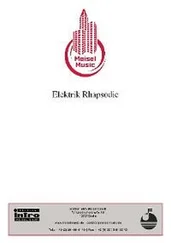A quarter of an hour passed and our lobsters arrived. Another Aurora appeared at the end of the street, wearing a long, black silk dress and blue ballet shoes, her hair smooth and still damp from her shower. Alyosha, let’s call him that, was still escorting her, taking large strides while she almost ran. Aurora was holding a violin case in her hand. When she reached us, she noticed a wooden crate abandoned outside the metal shutters of a greengrocer’s, and dragged it over to the restaurant terrace. The wood rasping on the road surface attracted the attention of the whole street. Irene was first to turn toward the sound with a grimace, then Antonio. I saw him freeze, petrified.
Aurora turned the crate over. It must once have contained oranges, it had the word “Jaffa” on it. She tested how firm it was with her foot and leaped onto it in one swift movement, standing with her feet along the edge. She waited for an amazed silence to descend, then laid her violin on her shoulder and wedged a cotton cloth on the chin rest.
“Heinrich Wilhelm Ernst’s Caprice for Violin on Schubert’s ‘Erlkönig’ …”
The chin rest was set very high, and Aurora hardly had to lower her head to secure the instrument, which looked like an alto next to Aurora’s tiny form in that black dress. She touched the strings twice with her bow, made a small adjustment to one peg to tune the E, and launched into the music with childlike energy, her bow fluid and active. The first staccato sequence implied this caprice would be an incredibly complex, virtuoso piece. Aurora mastered it perfectly. She didn’t look at Antonio, she had closed her eyes, concentrating, with a vertical crease down her forehead. On her temples I spotted an area of powder that the water had not quite cleaned away.
It took a matter of seconds for the violin to eclipse all conversation. A woman being heavy-handed with her fork was treated to an eye-popping stare by her companion, and put down her cutlery. The waiter stopped taking orders and leaned against the window. He stared at Aurora, open-mouthed. The very thrum of the street came to a stop. Antonio couldn’t take his eyes off Aurora. Irene silently plowed on with her half lobster.
Balancing on the wooden crate, Aurora drew a pure yet fragile sound from her instrument, like a soprano at the peak of an aria, but there was not a moment’s fear that she might fail. She allowed herself no leeway, even frowning and going back over a difficult passage where she alone could possibly have known she had gone wrong. I realized that Aurora could not cheat, that it wouldn’t have occurred to her. This deep-seated insistence on truthfulness was her trademark, her nobility, and her strength. It’s a cliché, I know, but the only image that came to me was of a princess on an orange box.
I sneaked a glance at Irene. I loathed wanting her so much, hated the violent appetite that urged me to look over at her Medusa eyes, the indolent back of her neck, her bare legs, her ass — no other word seemed more apt. For my desire was now tempered with contempt, a scheme to have her and humiliate her. If Irene had let me touch her that day, I wouldn’t so much have made love to her as taken her, avidly and vengefully, with no tenderness or feeling. Perhaps she detected this brutality in me, perhaps the evidence that I wanted her so badly drove her still further from me. I had even imagined every detail of this carnal scene and written the whole sequence in my notebook, so that I could realize it in a dream on paper and get it out of my system, but the words were so crude and violent they only increased my frustration and torment. I haven’t copied out any of that ignominious sequence in which I abased myself even more than her.
Aurora stopped playing abruptly, and everyone clapped for a long time. But she did not step off the crate. With her violin in one hand and her bow in the other, she waved and said simply,
“A poem by Fernando Pessoa. ‘Autopsychography.’
O poeta é um fingidor .
Finge tão completamente
Que chega a finger que é dor
Ador que deveras sente .
E os que lêem o que escreve ,
Na dor lida sentem bem ,
Não as duas que ele teve ,
Mas só a que eles não têm .
E assim nas calhas de roda
Gira, a entreter a razão ,
Esse comboio de corda
Que se charma coração .
The poet is a faker
Who’s so good at his act
He even fakes the pain
Of pain he feels in fact.
And those who read his words
Will feel in what he wrote
Neither of the pains he has
But just the one they don’t.
And so around its track
This thing called the heart winds,
A little clockwork train
To entertain our minds.”
There was some clapping, Aurora played a short legato and I thought she would step down and bow, but she carried on: “I recited that poem by Pessoa, it’s … one of his most famous poems, but we can never tire of hearing it because it is about lying and illusion and sincerity. I’m … now going to read you a text by … Jaime Montestrela … a major Portuguese poet who lived in Brazil during the dictatorship … an extract from one of his books … I Meet You .”
Her voice didn’t waver. She did not look Antonio in the eye once. If she looked at me it was only fleetingly, but the name Montestrela aroused Irene’s curiosity, and she whispered in my ear, “Is Montestrela that well known, then?”
Aurora plucked the strings of the violin to set a rhythm to her words.
“You have to read I Meet You as if it were an improvisation, the author … Jaime Montestrela … even indicates places where … where you have to stammer just like that so that listeners don’t know whether they’re already listening to I Meet You … It’s a text about a man or rather a young woman who thinks she’s met a man but all he did was spend some time with her and she’s hurt by this because … one morning after he’s slept at her house after they’ve made love no no no not made love those words don’t belong here at all says Jaime Montestrela we have to be accurate and describe this openly because the young woman leads him over to her bed she gently takes his clothes off then undresses herself and there she is naked offered she gets on top of him she guides him and now yes we can say the words they make love it’s still half dark but look the walls of the room are already being colored pink the sun is coming up over the city and the man wakes and looks at her she’s sleeping naked on the white sheet she’s so young her body’s so firm so taut almost a child’s body and something about her frightens him really frightens him it must because he gets out of bed that’s right he doesn’t stroke her doesn’t kiss her doesn’t even breathe in the smell of her hair no he gets up and dresses he has trouble tying his shoelaces and ridiculously he buttons his shirt too quickly and does it wrong and then he leaves he doesn’t leave a note on the table he’s never known what to say anyway he doesn’t even drink a glass of water in the kitchen no he opens the door as quietly as he can and there he is outside like a thief he closes the door without a sound he goes down the stairs on tiptoe and runs away that’s right he runs away the young woman knows this because no she was not sleeping no she stayed there motionless with her eyes closed and she heard his breathing his irritated groan about his uncooperative laces and when he was gone she walked over to the window and now she can see him running along the street and she understands yes yes yes he could have put down roots in her life like a lily on a pond who knows whether a water lily has roots or just floats on the water like Ophelia’s corpse … but there it is, that man would never have been able to melt into her no no he lets everything slip through his fingers like sand and with each betrayal his world becomes as tiny as he is … but here at this point Montestrela uses the young woman’s words he switches imperceptibly from she to I it’s a pivotal moment …”
Читать дальше
